#the silhouette could be a girl or enby or etc
Explore tagged Tumblr posts
Text
Alyx wasn't alone.
And she likely didn't leave.
Here me out: The first thing we learn about Alyx is she feels loneliness upon returning from the EverAfter. However, up until this point, she's been described as fairly estranged from everyone. No-one mentions her by name, humans are pretty hated by those who know what humans are.
So, why is she lonely?
Because Alyx didn't fall alone. She fell with someone else.
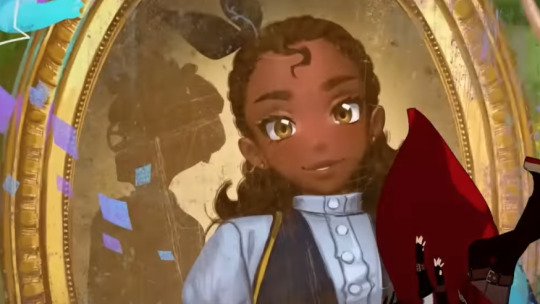
This person is the likely culprit, seeing as in the beginning we see two dashes across the sky.
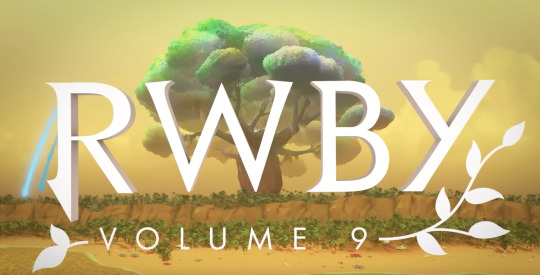
Considering a good dose of RWBY fairytales feature Ozma in some capacity, people making stories based on their own adventures isn't too far-fetched.
I'm thinking they both entered, but only one was able to leave. Maybe one person had to stay behind, maybe one of them died. Nonetheless, they wrote the story by erasing the second person or merging their interactions into one person.
How likely is it that Alyx had to give up both her happiest and saddest memory? Doesn't it make more sense if only one of them had to give up their happiest, and the other, their saddest?
We've already seen some revision. The Red King died! Likely killed by a human! We don't know for sure that was Alyx – it wasn't in her story. But how much can we trust her narrative, if there's possibly some heavy revisionism going on?
Listen to the Curious Cat. When Ruby says they're humans, they answer: "You're not nearly as interesting as the others I've met." That's otherS. Plural. Could be referring to Neo, Jaune, or maybe there's a whole village! But equally likely Alyx wasn't prancing around alone.
There's even more evidence in the song, Inside. During the instrumental break, I posit we get a conversation between Alyx and the mysterious companion:
"Okay, I'm almost certain that last time WE went to the left." "So, no way, WE should not turn back, WE need to go in that direction."
That only begs the question: why were they erased from the narrative?
#RWBY#RWBY v9#Rwby Alyx#Ruby Rose#RWBY theory#RWBY analysis#It's likely that the Girl Who Fell Through the World was written by Ozpin#like this guy says “I've lived through my fair share of them” and his lines always tend to have a retroactive alternate meaning#at this point!! YEAH!! he probably DID live through this fairytale#also how many male characters do we know that wear glasses#the silhouette could be a girl or enby or etc#could be Alyx herself? And she just changed to fit the narrativE?#Inside mentions a family estranged so maybe a sibling or cousin#lmao the Red Prince hated green and guess whose whole color is green: yep Ozpin this GUYYYY#maybe the Red Prince didn't untiny them bc Ozpin just untiny'd him and Alyx with Magic however unlikely lol#whatre the odds the dagger was the weapon of destruction?#If it turns out the book was used as the template for Ambrosius or something... hmmm...#ok Im done#geartalk#RWBY spoilers
81 notes
·
View notes
Text
Bee Yourself
When viewed from outside, the LGBTQIA+ community, is portrayed as a single, homogenous culture, with a few socially accepted experiences which cisgendered, heterosexual society expects use to conform to. In reality, the LGBTQIA+ community is an umbrella term for a multitude of distinct cultures, united by shared commonalities. This narrow view of what it means to be a part of our community can be extremely damaging to those looking to find themselves.
The Queer Look seeks to explore the identities and experiences of people within the LGBTQIA+ community. To show the many facets that make up a person, and the ways in which we express our identities physically.
The Queer Look aims to show that just because someone does not follow a traditionally accepted path to their identity, and does not conform to all stereotypes associated with that identity, that their experience is not less valid. A gay man who comes out in his forties is no less gay. A Lesbian who has had several boyfriends is no less a lesbian. A trans woman who does not want to wear dresses is no less a woman. And a trans man who refuses top surgery is no less a man.
We are here. We are queer. And we are as unique and distinct as the colours on our flags.
p.s. True to form, I was so excited about the first interview/photoshoot that I forgot to set up the recording equipment. Luckily, Bee took the time to answer a questionnaire that I sent after the fact, hoping to recapture the questions and answers received on the day.
Preferred Name: Bee
Age: 21
Location: Lewisham
Occupation/field of study etc: Receptionist, Arts - History/Gender Studies
Sexual Orientation: Bisexual
Gender: Non Binary
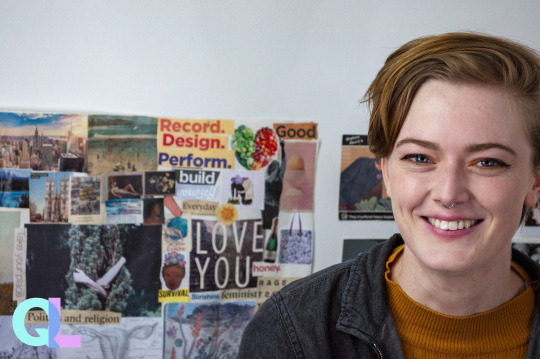
How would you dress yourself on an average day?
On the day-to-day I pretty much have a uniform! You will always find me in high waisted jeans, a white graphic tee and maroon Doc Martens. Some days I wear a binder but some days I don’t, depending on my dysphoria and level of laziness… I also always have colourful socks on because even if you can’t see them in my Docs I still love them.
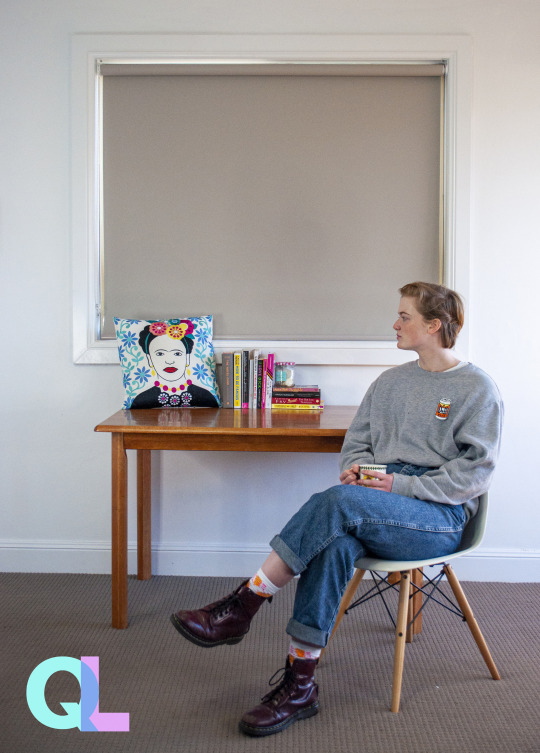
At what point did you realise that you were Bisexual?
I think I properly realised when I was at college in university. I was sitting at the dining table with a friend and we were going through my tinder which had all genders selected (although tinder was still pretty binary then…) and we were both commenting on how hot we thought everyone was. Another friend came and joined us and asked what we were doing, to which we of course answered: “oh we’re just looking at hot girls on tinder”. I asked her what she thought of the girl we were currently looking at and she said “oh no I’m not into women” I ended up asking her again because I couldn’t quite wrap my head around what she meant… and in response she said “I’m not really attracted to her because I’m straight.” I think at that point I was like, oh…. I thought everyone was just attracted to everyone??? Which in retrospect I can only eyeroll a bit at my poor baby self… because it really did take me way to long to put it all together… So even though that was the exact moment, I think that was more like the moment I discovered the label applied to me rather than the moment I realised.

At what point did you realise that you were Non-Binary?
I think it was probably a similar experience to discovering I was bisexual. I realised over a year ago now when I was in USYD Queer Revue in 2018. Being around a community of trans people was something I’d never had before and listening to everyone talk about gender and how they felt made me realise that I had a lot of the same feelings… I bought a binder during the show and trying it on I just felt so like myself? I still sometimes feel insecure that I don’t have the classic narrative of knowing I was non-binary since I was a child, because it’s the narrative a lot of mainstream media likes to use for transness. But I think I needed the time to be experiment with femininity before I finally was able to put a name to how uncomfortable I’d been with it for most of my life. I think realising I was non-binary was a lot of putting pieces together rather than a moment of instant clarity. But I’m glad it took me awhile to experiment and figure out what identity fit me.
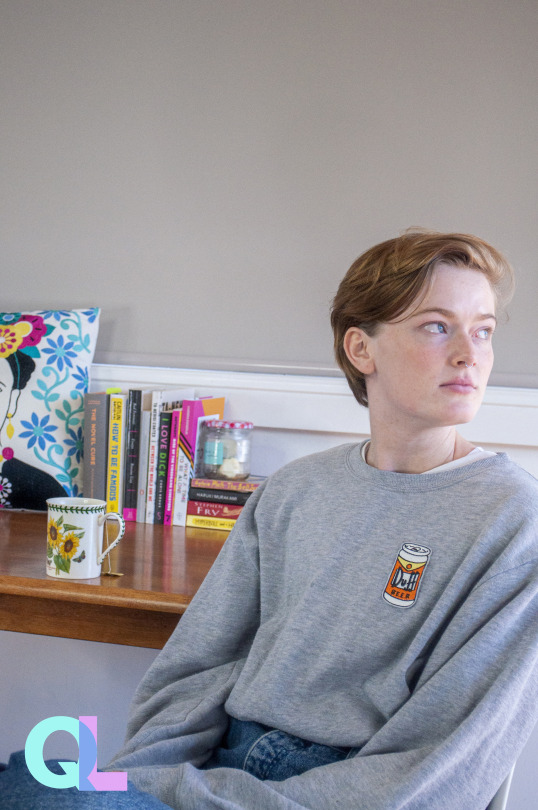
Have you noticed a distinct change in the way you present yourself from before these realisations to after? How has this changed since?
Definitely!!! I guess the first thing is that I stopped wearing things that make me uncomfortable! When I first came out I tried so hard to fit into the “traditional” narrative of being non-binary, which for afab non-binary people boils down to “if you’re not masc you’re not non-binary”. I wore my binder constantly, I lovvvved button ups and I wore a lot of low-waisted pants and baggy jumpers. After awhile I realised that it didn’t make me as happy as I thought it would, because even though I wasn’t being forced to perform femininity, I was still performing my gender. Now I think what I wear lies somewhere in the middle of what I used to wear before and after coming out. Before I came out I definitely tried as hard as I could to be the “perfect woman”. Lots of femme cut tops, dresses, skirts, heels (which god I hate wearing… just like so much…) and make-up. I still have a few of the clothing pieces I wore back then, but almost all of my wardrobe is completely different. I still wear elements now of what I used to wear – I have always been a jeans and graphic t-shirt person - but I now style them in very different ways.
I’ve also started to reclaim some of the things I vehemently rejected when I was in my masc phase. When I first came out I vowed I would never wear make-up again. But now I’ve come to love wearing make-up as a form of expression when I’m going out or to a party. I still feel pretty dysphoric wearing it day to day, but wearing colourful and bold make-up is something I’ve come to love again. I’ll also very occasionally wear a dress if I feel like it, but I tend to just wear the things that make me comfortable. Now basically all I wear is high-waisted jeans, they don’t give me a very masculine silhouette but when I see myself in photos or in the mirror I look like myself. I joke a lot that I wear a lot of dad fashion, and I think that’s maybe what I’ve become most comfortable in, knowing that people are probably still going to read me as a woman no matter what I wear (thank you heteronormativity…) so I may as well wear what makes me happy and for me that’s feeling like a fancy ass dad.

Do you believe that there is any weight to stereotypes about the way people dress based on their sexuality/gender? e.g. bi people tuck in their shirts, lesbians wear flannel etc. Do you believe that there are inherent differences in the way that lgbt+ people present themselves that make them more visible to other members of the community?
Oh god as someone who adheres to all the stereotypes (eep) this is a hard question! But yes, I think so. I think it really depends on the generation and identity. But I think a lot of people do wear things to make ourselves visible to each other. Whether that’s subtle things like adhering to stereotypes or more overt things like wearing activist or identity shirts.
But a lot of it just comes from LGBT+ culture. There’s an obvious style, way of talking, relating, and expression that LGBT+ people have developed historically and that almost all of us continue to participate in. I think a lot of it comes from musicians, particularly drag or music videos, historical figures like Bowie but now from lots of different singers like Janelle Monáe, Troye Sivan, Kim Petras, King Princess etc etc. I think stereotypes have developed because our culture is so prevalent, and most LGBT+ people adopt stereotypes unconsciously because we surround ourselves with people who express themselves in certain ways and are inspired by them. So, while sometimes we actively try to become visible to each other, I think it’s more that we’re all just hopelessly and lovingly enthralled in our own culture.
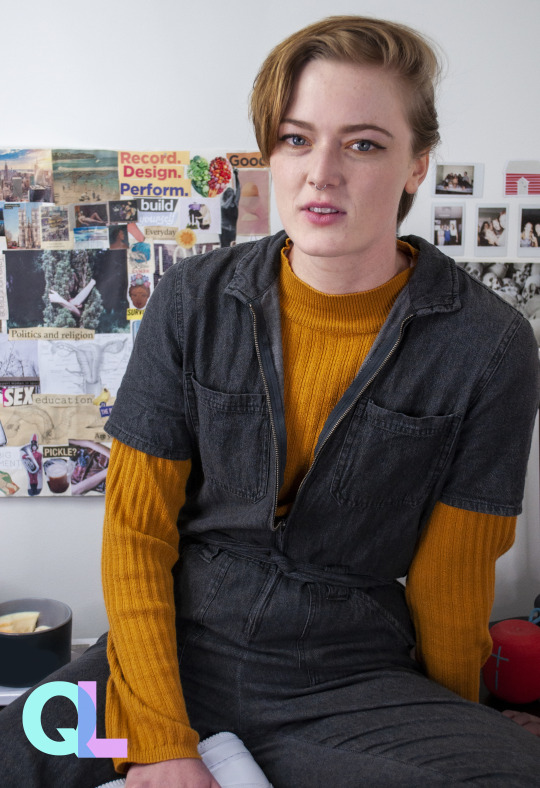
Do you feel that a lack of lgbt+ representation in media contributes to a more narrow, shared understanding of lgbt+ fashion, when compared to cis/het counterparts?
Oh god yes. Yes yes yes. Coming out as non-binary I think a lack of representation was so much of what contributed to me struggling with my identity. Before I came out I knew only ONE famous non-binary person… Ash Hardell I’m looking at you. While knowing about Ash was really helpful to me and representation of any form of expression is so important, the overwhelming narrative for afab non-binary people is that if you’re not masc presenting you’re not non-binary. For awhile that meant I tried so so hard to validate my identity by presenting as masculine as I possibly could. I cut my hair, I wore a binder every damn day, I wore joggers and button-ups, I wore hoodies constantly (because apparently to me that was the height of masculinity??). But after doing that for awhile, I realised I was just as unhappy eradicating every ounce of femininity from myself as I was when it was all I expressed. I think going through that process of experimentation was really important for me to realise that instead of trying to fit into what cis/het culture expected non-binary people to look like, I needed to just be myself first and wear what I love and want to wear and know myself that being non-binary is still part of who I am. And a HUGE part of that process was also finding femme presenting non-binary people, especially afab femme enbies. For me it helped enormously in accepting my body and realising that I didn’t have to hate it as violently as I was because it didn’t fit into the definition it was supposed to. Finding people like Dorian Electra (omg please do yourself a favour and look them up they are the epitomy of my gender), Alok Vaid-Menon, Tillett Wright, Sasha Velour etc etc made me realise that there are more ways to be non-binary than just one. Which is what is so damaging about having less representation – it only validates one path, so either you have to bush-bash yourself a new one (which is insanely tiring, emotionally exhaustive and scary) or you have to squeeze yourself into the one path that is provided for you to claim validity. Honestly, I could go on and on about representation but yes it’s so goddamn important. So Mark Zuckerberg and inc. if you’re reading this like I know you are FIX IT YOU HAVE SO MUCH MONEY PLEASE FOR THE LOVE OF GOD FIX IT.
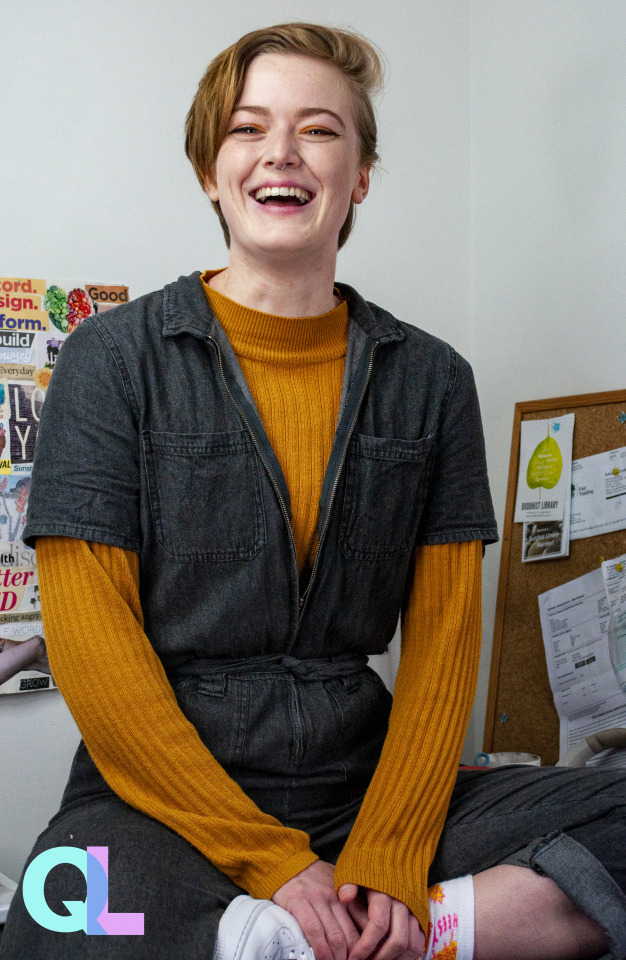
When you are in an exclusively lgbt+ setting, do you feel pressured to “play up” your queerness? If so, does this heightened queer exterior feel more true to yourself?
Yes, I think there are still definitely elements of performance to being in a queer space. Sometimes they can be negative, which generally come from the part of me that is still insecure about my identity and worried about how valid I am. I think a lot of queer spaces still hold at their core a performance of queerness that can be a bit exhausting? As cliché as it is, watching Hannah Gadsby’s Nannettereally helped me understand that. Because part of being queer is finding ways to survive, and so much of queer culture revolves around making jokes about our experiences that sometimes are so limiting in how they allow us to exist. We are all just so starved of space to talk about queerness, that when we can I think we all tend to fall into the trap of performing our identities as much as humanly possible. I’m really curious about how other queer people feel about it, but I think for me there is definitely an element of performance that I still struggle with a little. However, I am still so indebted and so in love with queer spaces and queer people. I always feel so at ease being around people who share a way of thinking. And I mean hey, I’m queer, performing is in my blood.
Find all images from the interviews on facebook: facebook.com/thequeerlook
follow us on instagram at: @thequeerlook
#thequeerlook#queerlook#the queer look#queer#bi#bisexual#bivisibility#lgbt#lgbtqia#lgbtqiaplus#nonbinary#non binary#pride#gay#pan#photography#portrait#portrait photography#identity#interview
11 notes
·
View notes